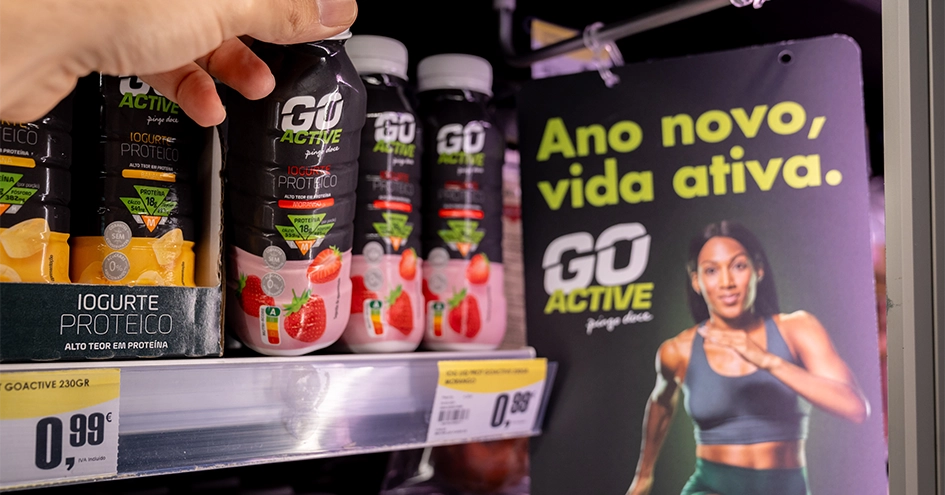Our product development priorities aim to position our Private Brands as the most relevant for consumers. These are some of the key principles we follow when launching a new product:
- Only launch products that have a better nutritional profile than the benchmark, which includes carefully selected ingredients and healthier recipes, and that receive very positive feedback from sensory panels.
- Pay special attention to the needs and preferences of children and other groups with specific needs, such as consumers with dietary restrictions.
- Regular review plans for product viability in the market, grounding commercial decisions on market research and product quality, nutritional and safety decisions on the most updated internal and external data.
|
|
Poland1 |
|
Portugal2 |
|
Colombia3 |
|
Total |
||||||||||
|---|---|---|---|---|---|---|---|---|---|---|---|---|---|---|---|---|---|---|
Gluten-free4 |
|
15 |
|
77 |
|
11 |
|
103 |
||||||||||
Lactose-free |
|
0 |
|
7 |
|
1 |
|
8 |
||||||||||
Vegan and vegetarian |
|
17 |
|
8 |
|
1 |
|
26 |
||||||||||
Organic |
|
2 |
|
11 |
|
1 |
|
14 |
||||||||||
|
||||||||||||||||||
|
|
Poland1 |
|
Portugal2 |
|
Colombia3 |
|
Total |
||||||||||||||||||||
|---|---|---|---|---|---|---|---|---|---|---|---|---|---|---|---|---|---|---|---|---|---|---|---|---|---|---|---|---|
|
|
2024 |
|
2023 |
|
2024 |
|
2023 |
|
2024 |
|
2023 |
|
2024 |
|
2023 |
|
Δ 2024/2023 |
||||||||||
Gluten-free4 |
|
131 |
|
109 |
|
1,318 |
|
1,411 |
|
12 |
|
1 |
|
1,461 |
|
1,520 |
|
-3.9% |
||||||||||
Lactose-free |
|
28 |
|
26 |
|
47 |
|
49 |
|
13 |
|
12 |
|
88 |
|
87 |
|
+1.1% |
||||||||||
Vegan and vegetarian |
|
154 |
|
156 |
|
33 |
|
39 |
|
1 |
|
– |
|
188 |
|
195 |
|
-3.6% |
||||||||||
Organic |
|
51 |
|
52 |
|
91 |
|
99 |
|
1 |
|
– |
|
143 |
|
151 |
|
-6.0% |
||||||||||
|
||||||||||||||||||||||||||||
Poland
Biedronka launched 71 new Private Brand products that encourage the adoption of healthy eating habits. Of these, 25 under the Go Active brand, aimed at consumers with an active lifestyle. The Company also introduced 14 new references in the vegan and vegetarian categories, most of them under the Go Vege brand, which are produced without GMOs and in compliance with legally-required criteria on vegan food1.
New launches also included the first Private Brand slow-cooked product for children and younger consumers, under the Głodniaki brand. This ready-made range was designed to help retain nutritional properties, avoid the use of preservatives and extend product shelf life.
Vegan products at Hebe
Hebe is committed to continuously launching new vegan products and products containing mostly natural ingredients under the Hebe Naturals brand.
In 2024, Hebe launched 62 new vegan cosmetic products, bringing the full vegan range to 151, and 16 Hebe Naturals products containing at least 92% of natural ingredients by net weight, bringing the total portfolio of products with these characteristics to 29.
Portugal
Pingo Doce and Recheio launched 50 innovative Private Brand references, such as:
- 16 Go Active products targeting consumers who prefer diets rich in protein.
- 3 references under the Pura Vida brand which offers products to consumers with specific needs such as gluten-free, lactose-free or Omega-3 enriched products.
- New vegan sausages by Pingo Doce and new vegan meatballs and croquettes from the Amanhecer brand.

Colombia
In 2024, Ara launched its first vegan product, a balsamic vinegar under the Arrivare brand. The Company expanded the De Mi Casa brand range with four new pre-cooked gluten-free arepas (a traditional flatbread made of ground maize dough stuffed with a specific filling), having no artificial colourings or added salt in their recipe.
The BEM brand (formerly Bien Vida) launched a gluten-free quinoa and rice toasted bread. The brand offers products made with high nutritional standards, allowing Ara to reduce the legal obligation to use warning symbols on products with high amounts of salt, sugar, sweeteners or fat.
1 The claims regarding suitability for vegan consumption must meet certain criteria, such as compliance with the Polish Agriculture and Rural Development Regulation on food labelling, which allows products whose production process does not include animal-based ingredients to be labelled “Certified Vegan” or “Suitable for Vegans”; good production practices so as to minimise cross contamination with non-plant-based ingredients; and to be GMO-free.
